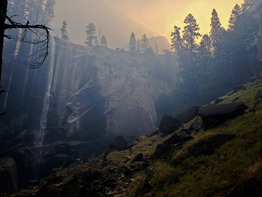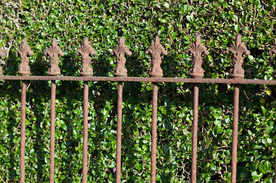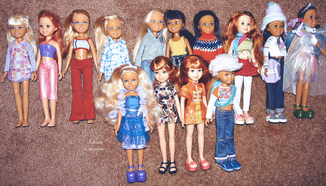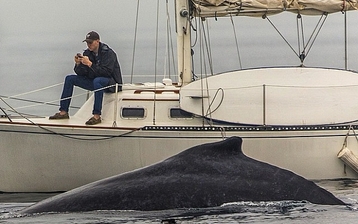 Our city designated one week in October “Go By Bike Week.” My first thought was that it was a bit trite if not redundant. I mean, why do we need to be reminded to ride our bikes? Reminders are all over the place—bike lanes galore, the “go green” chatter, the eyes of self-righteous colleagues as they rip off their helmets, shake their hair out, and smile. Maybe I felt guilty I don’t bike more often and this week was for me. Biking to work would take about three and a half hours. I’m not out to prove anything, so forget that. Stores, services, and church are within range, okay. On Sunday I peddled to church. My lungs vented, I was ready to sing, and my brain capillaries flowed, ready to receive grace. The rest of the week I didn’t really have to go anywhere, except to buy a couple gallons of milk, cereal, and a bundle of toilet paper for the family, which on a bike presented its own health hazards. So my bike rested. It dawned on me that I should get out more. I shut my laptop, glanced at the dishes in the sink on my way out, and climbed onto my bike. It’s a “street bike,” meaning “for city slicker wimps,” and I wear the label honestly. It looks like a throwback from the 40’s, which my kids think is funny, funny that I like that about it and that it’s green, but the color is important. A few blocks from the house is a small café that serves great pastries and sandwiches. I peddled there, the wind in my face, leaves beginning to turn. Sunlight falling through the trees caste bright, flickering patches on the pavement. My bike fenders rattled as I went over the ribs in the street. The moment transported me back to my first bike ride. My parents had got me a green Schwinn 24-incher with faded silver fenders for my fifth birthday. It was used, but to me it was a thing of beauty, the greatest possession I could have hoped for. On a gravel parking lot near our house, my older brothers held me upright as I made a few first wobbly attempts at riding. Then without warning, they let me go, and I was suddenly riding solo, moving faster and straighter . . . and then crashed. I didn’t even feel it I was so eager to get back on my bike and recover that new floating sensation. I was riding again, better now. Freedom flooded every pore, and I felt no limits to how far or where I could go, my bike simply an extension of my arms and legs. I circled the parking lot again and again as my brothers cheered. Those same feelings came back to me as I rode to the cafe. I was that kid again on that used green Schwinn with green plastic handle grips, the wind in my ears, without a reason or care. The sound of my old Schwinn came back, and the very smell of it. I could see the paint chips on it and feel its weight under me, carrying me, free, as if that bike had never left. At the café I ordered a latte, just enough calories to replace what I’d burned on the ride, and sat outside under an oak tree that had been there for generations. On the way home, I understood the reason for my Go By Bike Week—to live in the moment, bathed in wonder, free of thought and anxiety, forgiven and filled with innocence. To be a child.
1 Comment
 Among my load of Christmas email, I found a generous invitation from my daughter's teacher. Parents were invited to the class to share the traditions their families celebrate at this time of year. My heart warmed, and I volunteered. I arrived at my daughter's grade one class with my visual aids: our Christmas advent calendar and a creche. As I was about to speak, the teacher leaned in and told me, "Don't get into religion, okay?" I halted. Now, how was I going to go about extracting my religion from the traditions and symbols that embody them? I went on, tentatively, to explain how we used the advent calendar and nativity scene. I used the manger scene to show the kids the story that inspired the holiday -- the very first Christmas, Jesus' birth, 2000 years ago -- as the teacher watched anxiously. I engaged the class for ten minutes in a fairly lively back and forth. Grade one kids are far more curious and open minded than most adults -- lots of "why's" and begging for details. It went fairly well. No religious wars broke out. The teacher didn't lose her job. And my daughter was proud of her dad. But I also went away saddened by our society's intense suspicion of anything in our public discourse that smacks of religion. Schools of all places should be places where such discourse can and should happen, in an open forum of thought and mutual respect, free of fear of ridicule for our viewpoints Kids know the obvious, natural question: Why? Where did all this end-of-year holiday stuff come from and why has it risen to such a prominent place on our calendars? Furthermore, why are we not giving our kids the benefit of a full explanation rather than hiding among the fears and hush-hush? Are we so afraid our kids may fall off the deep end into fantasy lands of religion? So, we would rather expose them exclusively to our most trusted ally of the holiday -- Santa Claus -- rather than try explaining the origins of Hanukkah or Christmas? Don't get me wrong. My kids love Santa, and I've gone to great lengths to explain how he gets down the chimney into every kid's house in the whole world in just one night, employing the simple means of a 19th century sled pulled by a bunch of wimpy but clever deer through the stratosphere. Granted, my belief about Santa is far different than my belief about the first Christmas, but that is my privilege. Just as it is everyone's privilege to believe what they will about the first Christmas. I put no blame on my daughter's teacher. She is simply following the prevailing party line of the public education system and the code of society in general. Also, completely consistent with her message, "Don't get into religion," was the school's Winter Concert -- a medley of musical numbers. One glance at the program revealed a concert carefully disinfected of anything sounding remotely religious but replete with snowmen, marshmallows, saccharine aplomb and secular pabulum. I understand the fears. We've inherited a history beleaguered by attitudes of religious intolerance, oppression and abuse, even in our fair land of Canada. It's painful. And thankfully, a good dose of multiculturalism has awakened us a bit. But rather than letting ourselves be freed up by pluralism, we've shut down free thought and exploration. We've been driven to extremism of a different sort, enforced by our various institutions -- a blanket adoption of secularism and agnosticism -- the belief that humans are the only answer, that God is only a fantasy, and that rationalism is the only option since we can never know if God really exists. Ironically, these also are religious views. The warning "don't get religious" comes much too late. We're already religious and always will be. A brief look at history and literature shows we are by nature religious beings. The desire to know the origin and meaning of our existence and our world is as natural as the urge to understand the inner workings of the universe. Religious inquiry, even debate, is as worthy as inquiry in any other field -- arts, psychology, politics, history, science -- yes, even at the elementary school level. We've got to get beyond our fear of religious dialogue. Granted, it gets us into personal and murky waters sometimes and gets people excited. But why not grow up a little and take a chance at getting excited? Some of the best learning happens when people get uncomfortable. Our kids know better. We are doing them a great disservice by sheltering them, as our public schools seem intent on doing, from the vast array of religious thought represented in our communities. Our kids should be equipped with the skills of curiosity, discernment, and critical thought in order to navigate the wide religious waters of our society. And they will come to their own conclusions. Let's not underestimate their intelligence. We've done more than a fair job of training our kids in the ways of secularism and agnosticism. Now let's, as a society and as educational institutions, come out of hiding in fear, branch out a little, take a chance, and give our kids a chance. Let's get a little religious.  You may have noticed a one-year void in my blog posts. I've been focusing on another writing project. I'm working on a novel for pre-teens. At this stage, it's in the hands of potential agents, one of whom will hopefully see its merits and put it in the hands of a worthy publisher. Below is an excerpt from Chapter One. Tell me what you think. ..................................................... Kate opened her lunch for her sandwich. She took a bite and heard a low croaking sound behind her. She craned her neck to find a crow with her photo, which had fallen to the ground, in its beak. It cocked its head human-like to one side and dropped the picture, which came to rest on Kate's lap. "Hey, thanks crow," Kate said and laughed. She looked more closely. The crow had a white wing feather on one side, which stuck out ever so slightly from its wing. "How did you get that white feather?" she asked musing to herself. "Like a hair streak. Wow, cool crow." The crow flew off, its white feather flashing like a sliver of sunlight breaking through the mist. It landed in another tree, looked back, and croaked. Kate jumped down and ran after it, but as she came nearer, the crow flew off and landed again as if expecting Kate to follow. The crow continued from tree to tree until she had followed it all the way to the far end of the park. She crossed the street that marked where Shelby ended and Time Out Woods began. She was standing at a hedge of wild roses. She felt a strange, warm breeze from the woods. With it came an intense smell of strawberries. Strawberries? It was October and strawberry season had long passed. There was another gust of wind, warmer this time, and the smell was even stronger. She dropped her backpack at the edge of the rose hedge and parted the bushes, careful not to get poked by the thorns. She looked through into a small clearing dappled with sunlight. Behind her the park was still shrouded in a light rain. The normal entrance to the woods was a marked path off the street about one hundred feet from where she stood. But she continued through the rose bushes, thorns scratching her and snagging on the back of her shirt. When she had passed through, she found herself standing ankle deep in a small patch of strawberries. She picked one, tasted it, and then popped it into the back of her mouth. A burst of energy rushed through her and her senses came alive. Every smell of the woods seemed to rush to her nose at once. The shades of green in the woods seemed sharper and more distinct than she had ever seen them before. The breeze seemed to go down into the roots of her hair. It was like summer in the middle of October! Blossoms covered the rose bushes, and everything was green, while outside on the Shelby side of the woods, the trees were losing their leaves in the chill of fall. “So you decided to come in after all,” said a voice. Kate looked up startled. Above her in an old broad maple sat the crow with the white wing feather. Kate darted back toward the rose bushes. “Kind of silly to run back now after all that fighting through the rose hedge,” the bird said. “Uh...” Kate stuttered. “I was just following you. I thought... you were calling...” “I was, but I expected you'd shrug it off like everyone else does. Why did you come?” “I... I was bored, I guess. Doldrums?” Kate said. “Doldrums. Others have venture into the Kingdom because of doldrums. But I don't think that's why you came.” "The kingdom?" "Yes." "Kingdom of what?" Kate asked. "Of what?" echoed the crow, cocking its head to one side. “You said the kingdom. The kingdom of what... or who?” "The Kingdom of What or Who? Never heard of it." "No, the kingdom of, like, you know... who?" The crow shifted its weight from one foot to the other. "Never heard of the Kingdom of Like You Know Who either." "I mean what do you call... this kingdom? The Kingdom of Who? Who?" The crow cocked its head again and squawked. "The Kingdom of Hoo Hoo? Hmm, we do have owls... but it's not only theirs. It's everybody's kingdom... and everything's." "What?" asked Kate. "Neither the Kingdom of What nor Hoo. It's simply the Kingdom." "The Kingdom." "That's it! I know, in your world, you like to give the Kingdom names, like New York, or England, or Shelby, or Katmandu... But here it's just the Kingdom of... of what is." "The Kingdom of What Is?" The crow cackled a long laugh."Well, if you must give it a name, the Kingdom of What Is is as fitting as any." Kate suddenly shivered at the thought of talking to a crow. "Oh acorns, I'm scaring you, aren't I?" "A little... I'm a little confused. I love these woods, but today it's, like, enchanted. " “If you mean ‘enchanted’ as in fairies and pixie dust, I'm afraid you'll be disappointed. You won't find dragons, trolls, wizards or witches here. There's talk of them in places, but so far none found." "But you're like, uhm, a crow, right? None of this is real." "If you’re here long enough, you'll probably see that the Kindgom is more real than what you're used to.” The crow sighed deeply and looked off into the distance, as if he himself was taken by the simple wonder of the place. Then he cleared his throat and unfolded his wings as if to fly. “Wait! Wait!” Kate said. “How...” The crow relaxed. "Yes, how," he said and preened his white wing feather, thinking for a moment. "Thought you might ask. You want to know how you got here. Well, some would say that you brought yourself, but that would be ignoring the fact that mostly you were drawn here, quite beside yourself.” “Drawn here?” “You couldn’t resist, right? You’re a sensitive one, for sure. Others catch sight of it, through the trees, several times over several years but always miss it and never come in. But you, you've fallen right in, more or less beside yourself." “Beside myself,” Kate repeated to herself. “Yes, with delight... wonder... curiosity.... Some have found their way in by hacking through the underbrush until they find that they're finally in. Whatever their reasons, they usually realize they've been drawn in, either running in or simply by falling in unwittingly.” “Unwitt... what?” “Unsuspectingly... without knowing it... by surprise... quite beside themselves. Like you. Some have likened it to 'falling in love.' Never been in love myself,” said the crow somewhat apologetically, "but from what I've seen of it, falling into the Kingdom is much more profound and lasting." The crow scraped its beak on the tree limb. “Sorry for all the primping," he apologized. "There's only so much I can take of the garbage you've got out there in those barrels in the park. Eventually, it just sticks to your beak like a bad grub. Anyway... how you got here, yes... it’s like hearing a tune a few times, and before you know it, you find yourself humming it yourself. And you'll hum it over and over until, eventually, the tune becomes a part of you.” “Like an ice cream truck tune,” Kate said. "And then the ice cream becomes a part of you?" She chuckled. "Wait, did you say ice cream?" Kate was caught off guard. "Yes... what? You eat ice cream?" "The occasional drip or two, if I'm lucky. You don't have any, do you?" "Uh, no, not..." "Never mind. I'll have to do some scouting. To your point, like the tune from an ice cream truck, I suppose, if you consider that kind of tune catchy. But I suspect you like the tune because it comes with the ice cream, right?” “Yeah, of course.” “Fair enough. A tune is only as good as its reward.” The crow raised one wing tip, beckoning Kate to follow deeper into the woods. She hesitated, her heart pounding. Every tree, every pungent scent and warm ray of sunlight told her to keep going. But following crows was ridiculous, and talking with them was plain loony. Her mother would be wondering where she was by now. She started to push her way back through the rose bushes. She was halfway through when a branch snagged on her hoodie. She pulled, but the rose branch hung on stubbornly like a long slender arm and would not let her go.  September, 2015 A couple months ago we got our dog Bernie neutered, and now I'm experiencing regret. When I first inquired at the vet, I told the lady at the front desk, "We need to get our dog fixed." "Do you mean castrated?" she asked. Castrated. The word sounded so violent and final. I imagined our little Bernie exposed to the knife. I tried to be light and nonchalant about it. "Yeah, de-balled," I chuckled. The woman looked up and raised an eyebrow, unamused. "And the name?" "Bernie... or Bernard James," I smiled. "No, your name." Saying my own name injected an ownership in the whole thing that made me even more uneasy. She tried to reassure me, explaining how the "procedure" would all happened while he was under full anesthesia and that they'd also insert a microchip under his skin for ID and pull all his baby teeth while they're at it, too, all while he was asleep. "Wow," I said, "the whole enchilada." I felt a slight tremor and finally left Bernie with her. He came back home the same day in a complete stupor and walked around with a cone around his neck for seven days until he was back to normal. Except... Over the past couple months I've noticed Bernie has been acting different. He's not marking his territory as much as before and doesn't sniff other dogs as much. He doesn't play bite me as much and is less feisty. And of course, he won't be coupling for his entire dog life. He's become less Bernie. Less of a dog. I miss the old guy. I've questioned myself. Have we violated something essential and innate to the poor animal? Was the neutering really necessary? And it's made me think about human nature. It got me thinking about our tendency to try to "fix" things that feel unmanageable and uncomfortable. And if we don't fix them, we hide them. We suppress thoughts and feelings that are most personal and secret to us, even with those we claim to love the most, fearing we might alienate them. We neuter ourselves when we might be better served by taking a friend into our confidence and acknowledging things about us that feel out of our control. The prospect of being exposed is a fearful one. If the tiger is let out, it might go wild and devour everything in sight. We might risk our dignity or our friendships. But if we were to take a risk with someone we trusted, and knew that they would never betray or leave us if we shared X (fill in the blank) about ourselves, think about it. We might become freer, feel more completely accepted and loved, and we might deepen our trust and friendships. These thoughts may sound like a long stretch from getting our dog neutered, and I'm not suggesting any kind of "unrepressed sexual freedom." As humans we have some big advantages over dogs. We can reflect and choose what we let out without "going wild," so to speak. Getting Bernie neutered simply triggered some thoughts, specifically this: acknowledging, rather than masking, those things we find difficult and unpleasant -- wounds, regrets, anxieties, wrongs, addictions -- may be the door to greater spiritual health. In the Christian tradition, I think Protestants lost an important practice when they rejected Catholicism -- confession. I like the term "going to confession." The verb "going" makes it a deliberate act. We have to take a step to go. We're going to meet someone, in private, in confidence, to confess things that can never be revealed to any other soul. Just ourselves and the other person before God alone as our judge and forgiver. But even if we are not Catholic, making a discerning revelation about ourselves -- confession -- with the right person could be the beginning of new life.  August, 2015 I woke up and looked out the window one day early this summer as a mysterious pale yellow hue hung in the sky, casting a sepia tinge over everything. Wow, I thought, it's like the backdrop of a Renaissance painting. Then I got a faint whiff of something like charred wood. The news was that 100's of forest fires had been ignited in areas of British Columbia and Washington, some in temperate rainforests nearby that average 200 cm of rain a year. Our rainforests had turned into a tinderbox in the middle of a 3-month drought. In the weather reports, we began to hear a new and recurring descriptor: "smoky," or levels of smokiness, along with "mostly sunny." Reports came in of homes and camp grounds being evacuated and some overcome by the flames. The images from the TV screen were apocalyptic. The smell and the haze continued over Vancouver until the wind finally shifted, dispersing the smoke somewhat, and my mind began to clear a little. Questions of "why" arose. If I didn't know better, I'd say this was God's day of judgement. Or, man's judgement on himself. Or, perhaps, as some would say, a summer simply when "shit happens." Whichever view you take, there is no question our "smoky summer" raises feelings of vulnerability. Even in this pristine home of abundant rain and lush green, everything could be lost. The water supply is not limitless, even here, more so with more and more people finding a comfy harbour in this quiet little Lotus Land on the shelf of the Pacific. The smoky haze draws me inward to a more tremulous awareness of the tenuousness of life. I cannot speak for those who have lost everything. That is just disheartening and leaves anyone at a loss for words. But for me, I rarely feel this reluctant awareness that has been forced upon us, and this awareness is the good that has come from a summer of so much destruction. Yes, I think about what we've done to bring this on ourselves and what we should be doing to change our lifestyles to make such events less likely to happen in the future. I hope we all would. But more so, I've become aware of what I love most, and I hold those things more closely while holding everything else more loosely. I am more aware that my life does not consist of the abundance of my possessions and worldly dreams. It's foolishness to put my confidence in things that are not eternal. These temporal things God gives as quickly as they can be taken away. My life with God and those I love are eternal. That's all that counts in the end. And I remind myself, too, that in the end, in spite of droughts or other calamities, the earth and all God's children will be satisfied. In his own death, Jesus identifies intimately with the longings of the land, absorbing its sufferings in his own body, when he utters, "I thirst." And the promise of relief for this parched land is embodied in his resurrection. My wife's parents called from Manitoba. They say their summer has been one of the most productive they can remember because of the abundant rains, with farmers harvesting bumper crops. And this morning on a late day in August, here in Vancouver, the skies have finally opened up and let go with a good, steady rain. The ground, the trees, the very walls of the house are drinking it in like thirsty nomads on the verge of death. Our moods have brightened, and we are dancing in the puddles. "Keep it coming Lord, please, more... more... more," is our prayer. I love the book of Ecclesiastes. It helps put this summer into perspective for me. "There is a time for everything, and a season for every event under the sun . . . a time to mourn and a time to dance . . . ." Ours is to take it in with the life we have. Amid all other responses to bewildering events such as our summer's drought and fire, this is the best response I have while I hold onto Christ, who feels our thirst and will satisfy.  July, 2015 Maybe it's just the heat, but I've been thinking a lot about the desert lately. Or maybe it's because recently I've been thinking a lot about my brother, whose health has been faltering. I've always loved getting out on the desert with him. There's always a new canyon to explore, a gargoyle rock formation, a stunning vista. Whenever you come to rest, you're overcome by a similar impulse: silence. The endless space births it and demands it. At times the desert landscape sucks the breath from your chest, and any words you dare speak are lost into the vastness the moment they leave your mouth. The desert, I learned, is a place to listen. If you're patient, you may eventually hear the brief call of a bird, the scurry of an insect, the click of deer hooves on stone, or the wind through a crevice. But most of all you'll hear nothing but the deafening silence. It may frighten you at first. But if you have the courage to rest in it, you can get beyond the noise that's been echoing inside yourself for far too long. You'll look beyond yourself at the endless skies, and you may begin to feel very small. A bigger perspective takes over. If you manage to stay long enough, beyond the silence you may be privileged enough to hear the voice of God, saying simply, "I am God, and you are not." Okay, humbling, but for someone like me it's not a bad thing to feel at a loss for words. Our neighborhood is pretty quiet by urban standards. As I sit outside in the early hours writing this, the only sounds are cyclist peddling by, the occasional car, and the crescendo and decrescendo of a horde of crows. It's quiet, but it's not the remote, deafening silence of the desert. Only a few steps inside from my tranquil writing spot, or out to the streets, I'm deluged again by the noise of email, gadgets, and people wanting something. Then I long for another desert trek with my brother. The other night, I was reading a bedtime story to my four-year-old. She was distracted by her older sister who was also reading aloud in another corner. I stopped and asked if she wanted to listen to her sister's story or to mine. She said, "I have two ears. I can listen to both." My, how early and how subtly it starts. In this grand cacophony of voices you are born into, which ones do you listen to? How do you focus in on that one still voice in the silence from beyond eternity? Most of us cannot simply go to the desert on a whim. When I was doing my masters in theology at Regent College, among the treasure trove there, I was introduced to some of third-century Christian monks of the Egyptian deserts known as the Desert Fathers. They completely fascinated me. They were thoroughly versed in the Christian scriptures, and knew God's voice there. But they wanted to remove themselves from the vices and voices of civilian life to the desert to seek solitude, not for asceticism's or solitude's own sake but in order to attend more fully to the voice of God. Reading some of their wisdom (Sayings of the Desert Fathers), you soon see that they not only heard God speak directly into their lives but also heard God speak to the concerns of the thousands who sought them out. (I wonder at the thought of what must have become of their solitude.) Their movement grew, the first Christian monasteries arose, and they became the inspiration for much of early Christianity. The story of the Desert Fathers makes me realize this desire to hear God's voice runs very deep in most people throughout the ages. The challenge becomes finding his voice among the many -- kids, phones, collectors, tasks to be done, not to mention the liars and counterfeit gods -- that demand our attention. And then, are we ready for what we might hear, even if it is as simple and startling as "I am God, and you are not"? Perhaps we don't have to go very far to find the desert. There are many deserts, metaphorically, in our lives. I think of friends in financial difficulty or in troubled relationships. I think of my brother, and of my brother's family, as they see him slip away from them. When everything feels stripped away and we're looking into the vast unknown, and when all other voices become mute to us and the silence at times becomes deafening, perhaps then God speaks most clearly. Call it grace. We may hear him directly, or we may hear him through another who has been in the desert, but when God's voice does come, the moment will be a gift given at the appropriate time.  June, 2015 A few weeks ago, our church pastor said something that has been echoing in my mind since. He warned us to "keep a soft heart" and not let ourselves become jaded and "indifferent to the world's pain." This is quite a different message from the triumphal, pull-up-your-bootstraps faith-and-determination types of messages you might be used to hearing when it comes to crisis and suffering. This pastor's words -- keep a soft heart -- strike me as so apt for today with the relentless news of the world's pain, from wars and rumours of war to the ravages of a climate seemingly going haywire. But you don't have to go that far. You'll find poverty, conflicts, loss, and illness close at hand, as they have been always. Indifference and triumphalism are two increasingly common and opposite responses to the pain of the world, but both wrong. The one is a callous turning away and the other a haughty imposition, but both void of feeling or understanding. Yet, when you look around, these tend to be the most obvious and frequent responses: "Nothing you or I can do about it, just forget about it and take care of yourself." "Why can't people just believe and live the way I do? Then they wouldn't have those problems." I am guilty of both. I have a family with two young kids. The tendency is to turn away and simply take care of my own. Our property is hedged and fenced in, and I sometimes wonder if this barrier is symbolic of my own heart towards others. Then I realize, what could be more contrary to nurturing my family's growth than to demonstrate this private and impervious attitude to the world? There are few things I want more for my kids than that they develop empathetic understanding and caring of others, a goal far greater than all other things we typically call "success." The pastor said we would "become less human if we let ourselves go down the road of indifference." A warning worth considering. But the next day, I might react in an equally bad way. I might take a judgemental, self-righteous posture until I'm nearly yelling at the news as it comes over the TV, instructing the TV on the exact course of action to correct this or that social ill. Why can't they just apply some common sense and goodness like I would? Needless to say, meanwhile, I know little of the background and real circumstances of the particular situation, and I'm obviously still sitting in my chair. A soft heart, the pastor said. It allows the pain of the world to come inside to where we feel it. When we feel it, we can live the pain along with those who suffer, and even with those who cause suffering, because we realize we are not all that different. Coming this far, we become truly responsible, and only then are we able to truly respond because we know we are part of the problem, not outside the problem. We can no longer either hide behind our hedges or stamp our feet from our soapboxes. But where does this softness of heart come from? How can I get it? My pastor would say a soft heart is a gift, not something we work up within ourselves. It has to be given, and what we have to do is ask God for it. But this is a proposition that requires humility, which is not a common posture for a society bent on self-sufficiency. But if we were all bold enough to ask and then accept the gift of a soft heart, I wonder what courageous acts of compassion and healing would follow.  May, 2015 At a church retreat recently, I was asked to speak on the question “What are the sacramental moments in your life?” I somewhat messed it up. Should have written it down, I guess. But I was forgiven by the smiles and forward leaning support of my church friends, by their thanks, and by the fresh mountain air. The advantage of a blog like this is you get a chance to redeem yourself and say what you wish you had said. What I meant to say was how much I have come to appreciate the mundane cycles of life. When I was unmarried and had no kids, I never had a five-year plan, always looking for something new and adventurous. Now I’m on a family tenure track that will take me at least 15 years into the future. Maybe it’s the artist in me craving structure, but somehow I'm finding satisfaction in the everyday hum drum. Life’s regular patterns seem more acute than they used to. I feel more attuned to the rhythms of the day, the month, the year. Instead of making me restless for change, these rhythms put me at rest like the hum of a familiar lullaby. One way I see these rhythms is in the church calendar, a cycle that could be considered a prototype for all others. I used to view the church calendar as simply a convenient contrivance to give the pastors something if they didn’t know what to talk about. Looking at it more closely, I found the church calendar takes us through an experience of the gospel narrative: the anticipation and birth of Christ in Advent and Christmas; the revelation of Christ in his life and words in Epiphany; Christ’s suffering and death in Lent and Good Friday; the resurrection in Easter; and new life and restoration in Pentecost. It is an annual re-enactment of the gospel with Jesus and us as the players. And this play has no closing night. You repeat the story every year and it's a new experience every time. It's sometimes a mess and sometimes a feast. If you screw up your lines, you always get another chance. We can find this “gospel cycle” – birth, death, redemption and restoration - repeated in our daily lives. I see it in my girl’s initial excitement about learning to ride a bicycle and minutes later the cries from her first fall, and then her struggle to get back on her bike again. I see it in my wife’s bringing to life a new recipe she’s wanted to try and the subsequent joy, sometimes disappointment, over the dinner table. I see the gospel narrative relived in family conflicts that need daily resolution and forgiveness. And I see restoration in a simple family outing. On any day, you may find yourself at any given point in this gospel narrative. It's easy to become myopic, focused only on our personal situation. But the church calendar reminds us of the bigger picture, of the grand narrative arch, and the end of the story is quite sweet. The gospel story is full of dramatic events, which to most of us seem fairly rare. But looking for the spectacular, we sometimes miss the very down to earth, ordinary qualities of the gospel. Most of our lives are lived by rather mundane rhythms. I wake up, take the dog out, look at the weather, go to work, pick up the kids from school, play, have dinner, put the kids to bed, take in the news, crawl into bed, try not to wake up Diane, think, pray, and sleep. Repeat. But in these ordinary rhythms, I'm caught in a cycle of quotidian love. Even at work I can see the gospel cycle. Each new semester I walk my students through a progression of activities that will hopefully, eventually bring them to being better users of the English language. I tell them something as seemingly mundane as punctuation helps you feel the rhythm of language and brings understanding of the text. Interestingly, I notice I’ve come to prefer periods over semi-colons because periods offer a longer pause for rest between thoughts. They’re like a “language Sabbath.” Walking around the retreat grounds, I was taken up by the mountain air slowly warming in the spring sun. Kids and adults played in an open field. The peaks struggled to shake off clingy clouds, and down below a breeze shook poplars into holograms of translucent greens. It seems the more we persist in our efforts to destroy our planet, spring is even more irrepressible and resplendent. The natural world repeats God's story "in ten thousand places," as G. M. Hopkins puts it. Everywhere, the gospel echoes through the years, the months, days and hours. Surrendering to these ordinary rhythms, I feel more deeply grateful. I am at rest. I am cared for. I am cradled and rocked to a familiar divine rhythm.  April, 2015 My 6-year-old daughter looks down at the dolly in her hands meditatively. “Jackie likes my things more than she likes me,” she tells her mom sadly. A show-stopper of a comment. Jackie is her best friend. Her mom and I look at each other. Kaitlyn notices that when her friend comes to the house, she’s often so preoccupied with the dolls and toys that she forgets Kaitlyn is there. She’s hurt. Many parents will relate when I say I felt her pain more acutely than if the pain were my own. There comes a time when you have to acknowledge the hard truth with your kids: Yes, you should expect your best friend to love you more than anything they can get from you. I like to think I’ve grown up a bit, but Kaitlyn’s comment made me wonder if people ever say that of me. How much do I use people for my own ends and how many use me? Who have I schmoozed with – at work perhaps – to get something I wanted? Who have I left hanging when his need was so great that I had to turn away, realizing that helping him required an investment of myself that I could never expect to give me a fair return? “Love is its own reward” is often not enough to sway me. The pain and stress that love involves are sometimes more than I can handle. So I walk the path of least resistance in the other direction, assuming the person will get help or get over it, or thinking I’ll just pray for him. I ease my conscience by reasoning that even Jesus withdrew from the crowds in order to pray on occasion. He didn’t give in to people’s demands to perform like a non-stop spigot of healing water only so they could leave after they got what they wanted and forget about him. But it seems from the record that not many people forgot about Jesus once they really met him. But why did they follow him in droves? Many may have been initially attracted to him for what they could get out of him, but these people would have been sadly disillusioned when they found out what he was really about. He didn’t exactly offer them a life featured in Western Living magazine. So why did they, nonetheless, go after him so? There must have been something in the way he healed people. I don’t get a picture from the gospels of Jesus doling out miracles indiscriminately and impersonally. You can read it for yourself, but it seems his words and acts of healing are always very personal. People must have noticed and were attracted by this, beyond the sheer amazement over his miracles. He looked people in the eye; he breathed on them; he touched people, even lepers; he washed people’s feet (if you really want to know what vulnerability feels like, try this with a friend); he took his time, mixing his own saliva with earth elements to make a poultice; and he spoke directly and specifically to their need as if he saw right into their hearts. I think this is what marks Jesus’ brand of love as genuine and of God. Going after him for what one could get out of him would not have the staying power that a personal interest in them would have. Our tendency, when we meet people, is to silently gage what we might get from the relationship. And when we help people, we often tend to assess them first as a set of needs to be satisfied or problems that need to be fixed, and then determine the payoff. There is little compassion in this. No wonder we feel weary and anxious in well-doing! With this “exchange” approach, either side may get what we want, but the relationship may not have much staying power. When we see to the heart of a person, and understand love as attending to people first rather than to their needs first, a transformation happens, in ourselves and in the persons we love. And they will come back to us, more likely because of who we are than because of the things we have. It’s not only kids who have to learn this.  March, 2015 You may have seen this photo. It went viral a couple weeks ago. Normally, when I come across viral content, I might cast it a cursory glance and then quickly ignore it as more space junk. But this photo made me take notice. A man sits on the bow of his yacht with his eyes glued to his phone, apparently oblivious to the dramatic event happening right beside him--a whale surfaces as if to say "Hello?" to the man who remains submerged in his own world. The irony could hardly be lost, you'd think, on even the dullest of yacht owners with a smart phone. An obvious caption for this photo could read, "Are we missing anything?" According to social commentaries, we're missing less and less these days. At no other time in history have we been so informed about everything. Yet, we are consumed with a fear that we might miss something, and to allay our fears we carry our info gadgets with us everywhere, constantly groping for them as insurance against potentially being out of touch and out of the know. Apple is well versed in how to capitalize on this fear. Today they're feeding our obsession with "being in touch" with the their new Apple Watch. The watch (not the first of its kind) does many of the things our cell phones have been doing--taking phone calls, sending messages, connecting us to www, plus a few added tricks. For example, it can tell us when we've been sitting too long. (too long watching our watches?) How thoughtful of it. But the real breakthrough, according to Apple, is that "It's not just with you, it's on you!" Glory! What used to be at our side like an old friend (the cell phone) is now physically right on us like a lover. If we could make love to a gadget, apparently this is the ultimate experience. But while we're being persistently seduced by the touch of this "smart" technology, are we, as many have argued, increasingly out of touch? There's a reason one of these famous gadgets is called an I-phone. It's all about me, according to Steve Jobs. Nothing else matters, only the touch of the phone. Hand in hand with it, we're blissfully isolated from all else. I find myself playing "what if" scenarios as I see this photo. What if this man could not afford a cell phone? (Yes, there are those people.) Or, what if he voluntarily gave up his cell? Let's say he tries going without it for three hours a day. He starts to notice things. He feels the power of the ocean like he hadn't before, tastes its salty brine more acutely, and feels his heart leap as a whale breaks the surface just a few feet away. The experience of raw unfiltered life awakens something in him and causes him to seek out similar experiences in the real world. He feels the urge to have more face to face time with the people he supposedly loves. He finds himself holding the hand of a friend in need when he would normally just shoot off a text, "How r U?" He feels a greater need for physical presence. He begins to realize that this is a spiritual issue. What started for him as a deeply terrifying proposition turns out to be a bargain--his cell phone in exchange for the world--as he realizes he feels more whole, he feels like he owns the earth as his home again. He recalls a line from Jesus: "Blessed are the poor, for they shall inherit the earth." He thinks about people who live without a lot of technology. They seem much closer to the earth, to each other, and more content without lots of hi-tech gadgets constantly wedging themselves between people and the land. They're the ones really in touch. They're the wealthy ones! The man wonders if he should make himself wilfully impoverished in order to "inherit the earth." He is feeling more connected without his phone 24/7, and he wants more of this. Detachment from our things is a scary, radical prospect, especially if this means letting go of something we've held as close as a brother. But detachment seems to be what Jesus was after: to disown encumbering distractions in order to own the earth and have a more abundant life. Essentially, we're being called back home to what we were made for, to the earth and to God, not by voice mail or by text but by Spirit. If that means becoming impoverished of things that are interfering with real life, as painful as it may be, so be it. In the end, we won't be missing anything and gaining everything. |
Archives
January 2024
Categories |
 RSS Feed
RSS Feed